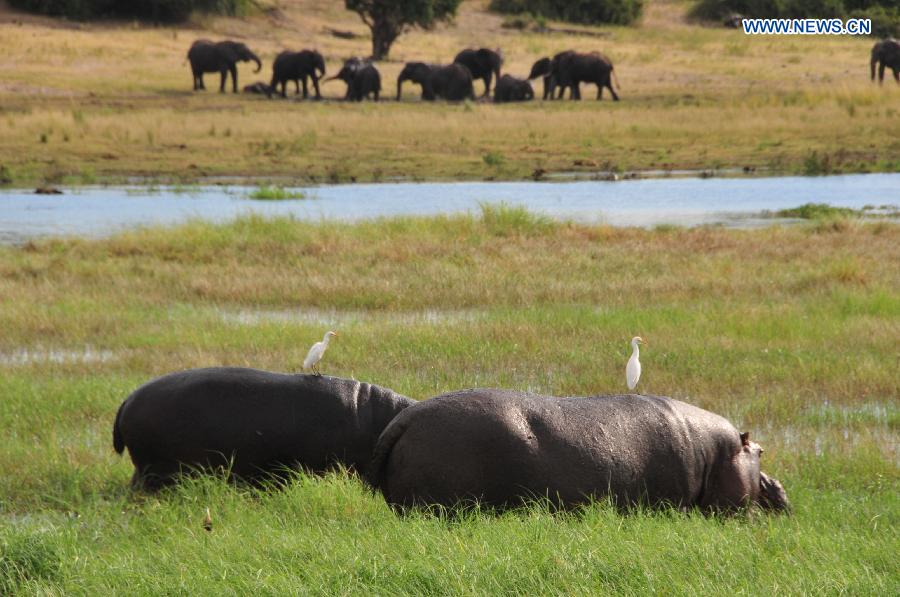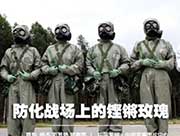

 |
| (Photo/Xinhua) |
UNITED NATIONS, July 30 -- As wildlife crime becomes an increasingly global problem, the UN's 193 member states on Thursday adopted a resolution committing to improving national and international efforts to prevent, combat and eradicate the illegal trade in wildlife.
The resolution -- which was sponsored by 86 countries, including China, and adopted by the General Assembly of 193 countries -- calls on governments to step-up their efforts and work together to tackle the crime which has become a lucrative form of income for international crime syndicates.
The new resolution expressed the General Assembly's serious concern over the steady rise in the level of rhino poaching and the alarmingly high levels of killings of elephants in Africa, which threaten those species with local extinction and, in some cases, with global extinction.
"Illegal wildlife trafficking not only threatens species and ecosystems; it affects the livelihoods of local communities and diminishes tourist attractions. It compromises efforts towards poverty eradication and the achievement of sustainable development, " said the president of the 69th session of the General Assembly, Sam Kutesa, in remarks read by the vice president, Denis G. Antoine.
Adopting a consensus text resolution, the General Assembly encouraged governments to adopt effective measures to prevent and counter the serious problem of crimes such as illicit trafficking in wildlife and wildlife products, including flora and fauna and poaching.
Emmanuel Issoze-Ngondet, the minister for foreign affairs of Gabon, told the General Assembly that countries needed to work together to tackle wildlife crime.
"Countries of origin, of transit and of destination must work together," he said.
According to Issoze-Ngondet, a united approach is needed because wildlife crime is increasingly carried out by well- organized criminal networks.
"We are dealing with well-organized international criminal networks that are working for their own profits," he said.
He added that the flow on effects were not just environmental but also contributed to other problems, providing funds for terrorist activities and contributing to the proliferation of arms in Africa.
"Terrorist and armed groups operating in Africa notably are using poaching and illicit trafficking in wildlife to increase their funds," he said, adding that this in turn leads to armed groups acquiring more sophisticated weapons and "contributes to the proliferation of weapons in Africa."
Elisabeth McLellan, the head of the World Wildlife Fund's wildlife crime initiative, agreed that international organized crime syndicates are increasingly driving the illicit trade in wildlife across borders.
"Increasingly, the illegal wildlife trade is being driven by international organized crime syndicates," McLellan told Xinhua by email.
"Wildlife crime is now estimated to be the fourth largest transnational criminal activity in the world -- after the trafficking of drugs, counterfeit goods, and people," she said.
Many people around the world were shocked and united in dismay this week after learning that Cecil, one of Zimbabwe's most famous lions, had been shot and killed by American dentist Walter James Palmer.
Harald Braun, the German ambassador to the UN, highlighted another death that occurred earlier this week.
"On Monday of this week the first elephant was poached in the famous Kruger National Park in South Africa," he said. "The ivory poachers are now moving south."
While in Tanzania, he added, there has been a 60 percent drop in the elephant population in past five years due to poaching.
Issoze-Ngondet said that the devastation has now reached extreme proportions with more than 20,000 elephants killed each year in Africa.
For the resolution to work, it will rely on the members of the United Nations taking actions to combat the problem both nationally and internationally.
"It is up to individual countries to take action to enhance protection for their wildlife, strengthen their judicial processes and reduce demand for illegal wildlife products," McLellan said.
She added that UN's role will include ensuring countries take actions to ensure the resolution is implemented.
"The UN and some of its agencies, including the UN Office for Drugs and Crime (UNODC), will play a critical role in monitoring wildlife crime and ensuring that countries begin to implement the measures in the resolution," she said.
Day|Week

 China starts assembly of world’s largest amphibious aircraft
China starts assembly of world’s largest amphibious aircraft PLA's only woman CBRN emergence rescue team
PLA's only woman CBRN emergence rescue team Stunning! Gorgeous girls practice yoga on 2,000-meter-high cliff
Stunning! Gorgeous girls practice yoga on 2,000-meter-high cliff PLA Air Force fighter aircraft in action
PLA Air Force fighter aircraft in action A glimpse of China's Zijinshan gold & copper mine
A glimpse of China's Zijinshan gold & copper mine Be an ageless goddess like them
Be an ageless goddess like them Hot figure show in SW China
Hot figure show in SW China Evolution of Chinese beauties in a century
Evolution of Chinese beauties in a century